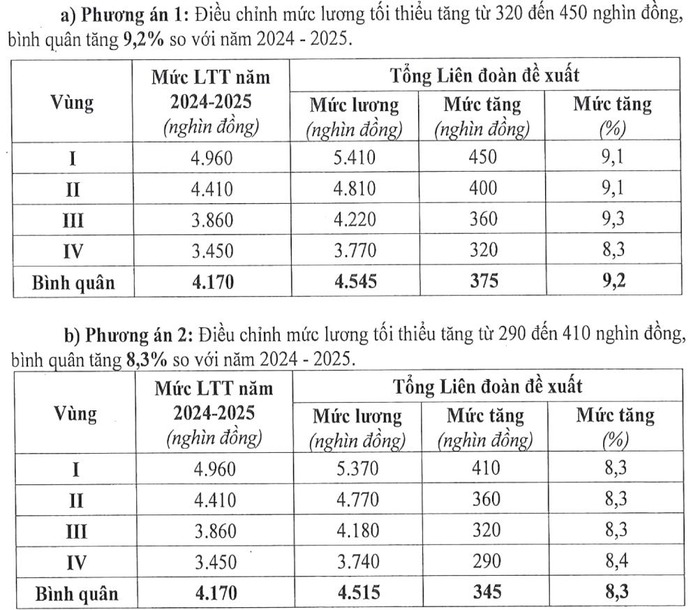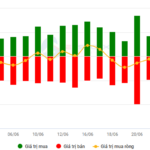On the morning of June 26th, in Hanoi, the National Wage Council held its first meeting, chaired by Mr. Nguyen Manh Khuong, Deputy Minister of Home Affairs and Chairman of the National Wage Council, to discuss the minimum wage plan for 2026.

Low incomes force workers to take on additional jobs to make ends meet. Photo: HONG DAO
At this meeting, the Vietnam General Confederation of Labour (VGCL) proposed two options for increasing the minimum wage to ensure a basic standard of living for employees. The suggested increases are 8.3% and 9.2% compared to 2024-2025. They also recommended that the new wage rate take effect from July 1st, 2025.
Meanwhile, representing employers, Mr. Hoang Quang Phong, Vice President of the Vietnam Chamber of Commerce and Industry (VCCI) and Vice Chairman of the Wage Council, stated that the proposed adjustment range is between 3% and 5%.
“This range is reasonable, as it provides businesses with adaptability and the ability to reward diligent workers, especially in effectively implementing Resolution 57 on improving labor productivity and innovation,” said Mr. Phong.
Mr. Phong emphasized that the specific increase needs to be further negotiated within the council, and there is no official decision yet.
While the VGCL proposed an immediate wage increase from July 1st, 2025, the employers’ representative suggested that the new minimum wage take effect from January 1st, 2026.
The council’s technical department also proposed a minimum wage increase of between 6.5% and 7%.
Thus, there are significant differences in the proposed wage increases from the three parties.
According to the VGCL, based on reports from provincial labor confederations, industry-wide trade unions, and equivalents, as well as trade unions of total companies directly under the VGCL, on the implementation of Decree No. 74/2024/ND-CP, most enterprises have seriously implemented wage adjustments with an average increase of 6%.

VGCL proposed two options for increasing the minimum wage
The VGCL’s survey results (conducted in March and April 2025) in 10 provinces and central cities, with nearly 3,000 employees responding, showed that 54.9% of employees said their wages and incomes were just enough to cover their family’s basic expenses. 26.3% had to be frugal and spend sparingly, while 7.9% did not have enough to live on and had to take on additional jobs to earn extra income.
In the context of income not meeting family spending needs, leading to workers having to “tighten their belts” and save to make ends meet, many employees have to borrow money to cover unexpected expenses. Specifically, 12.5% of employees regularly (monthly) borrow money to stabilize their lives, while 29.9% occasionally (3-4 times a year) borrow money.
Only 55.5% of employees can afford to eat meat and fish in all main meals (excluding meals provided by the company). Therefore, a significant number of people do not have a stable and adequate diet, affecting their physical health, work efficiency, and productivity and reducing their quality of life and that of their families.
According to the VGCL, up to 72.6% of unmarried respondents stated that their wages significantly impact their decision to start a family. Employees feel that their current income is not enough to ensure a stable life when starting a family, especially given the rising living and child-rearing costs.
Wages not only affect daily spending but also impact buying a house, saving for the future, and meeting the basic needs of a new family.
Among those who are already married, 72.5% said their current wages and incomes influence their decision to have more children. Adequate income levels cause couples to worry about their financial ability to raise children, especially as the costs of education and healthcare are becoming more expensive. As a result, they are postponing having children to ensure a better quality of life for themselves and their families.
The New Minimum Wage: Effective July 1st
As of July 1st, the method of determining the minimum regional wage will shift from being based on district-level administrative units to being based on commune-level administrative units.
A Proposal for Regional Minimum Wage Increase from July
The representative cited that since 2023, electricity prices have surged four times, amounting to a 17% increase, while the minimum wage for workers has only been adjusted once, with a mere 6% increment. The proposal urges an immediate review and adjustment of the regional minimum wage, effective from July onwards. This is deemed a pressing necessity to address the practical needs of the working population.
The Rising Cost of Electricity: A 400% Hike While Minimum Wages Lag Behind
“As of 2023, electricity prices have surged by 17% with four price hikes, while the minimum wage for workers has only seen a single 6% increase. This disparity between the rising cost of living and stagnant wages is a pressing issue that demands attention.”














































